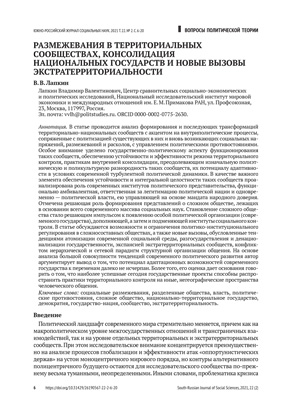Abstract
The article analyzes the formation and subsequent transformations of territorial-national communities with an emphasis on internal political processes associated with the politicization of existing and emerging cleavages and disagreements, with the management of political confrontations. Particular attention is paid to the state-political aspect of the functioning of such communities, ensuring the stability and effectiveness of the territorial control regime, the practices of internal consolidation that overcome the initial multiethnic and multicultural heterogeneity of such communities. Attention is also paid to the potential of their adaptability in the context of modern turbulent political dynamics. The functionally ambivalent role of modern institutions of political representation is analyzed, which is responsible for ensuring the stability and integral integrity of such communities, as well as for legitimizing the political nation and, at the same time, for legitimizing the political power, through the mandate of popular trust. The decisive role of the formation of ideas about a complex society, which underlie the entire modern array of social sciences, is noted. Becoming of a complex society has become a decisive impetus for the emergence of a special political organization (the modern state), which supplements and then replaces the institutions of social control. The article discusses the possibilities and limitations of political and institutional regulation in complex societies. And also — new challenges caused by the tendencies of atomization of the modern social environment, destatization and denationalization of statehood, the expansion of extraterritorial communities, the conflict of hierarchical and network paradigms of the structural organization of communication. Based on the analysis of a large set of trends in modern political development, the author argues for the conclusion that the potential of the modern state’s adaptive capabilities to change is far from being exhausted. Moreover, his assessment gives reason to say that the most successful state projects today are able to extend the practice of territorial control to other, non-geographic spaces of human communication.
Keywords
References
- Bardin, A.L. (2021). Tsifrovye razryvy v sovremennom megapolise: politicheskoe izmereniye [Digital Divide in the Modern Megapolis: Political Aspects]. Polis. Politicheskie issledovaniya [Polis. Political Studies], 6, 73–88. DOI: https://doi.org/10.17976/jpps/2021.06.06.
- Bogaards, M. (2019). Consociationalism and Centripetalism: Friends or Foes? Swiss Political Science Review, 25(4), 519–537.
- Guelke, A. (2012). Politics in Deeply Divided Societies. Cambridge MA: Polity.
- Hartzell, C., Hoddie, M. (2015). The Art of the Possible: Power Sharing and Post-Civil War Democracy. World Politics, 67(1), 37–71.
- Jessop B. (2016). Gosudarstvo: proshloe, nastoyashchee i budushchee [The State: Past, Present, Future]. Moskva: Izdatel’skiy dom “Delo” RANKHiGS.
- Ilyin, M. V. (2008). Vozmozhna li universal’naya tipologiya gosudarstv? [Is It Possible to Create a Universal Typology of States?]. Politicheskaya nauka [Political Science], 4, 8–41.
- Ilyin, M. V. (2011). Predely gosudarstvennoi sostoyatel’nosti stran mira [Varying Ranges of Individual Countries Stateness]. Politicheskaya nauka [Political Science], 2, 60–74.
- Kudryashova, I.V. (2016). Kak obustroit’ razdelennye obshchestva [How to Accomplish Stability in Divided Societies]. Politicheskaya nauka [Political Science], 1, 15–33.
- Kudryashova, I. V. (2020). Upravlenie etnokulturnoy raznorodnost’yu: kontseptsii i politicheskie resheniya [Management of Ethnic and Cultural Heterogeneity: Conceptions and Political Decisions]. In I. V. Kudryashova, O. G. Kharitonova (Eds) Metamorphozy razdelennykh obshchestv [Metamorphoses of Divided Societies] (pp. 15–41), Moskwa: MGIMO-Universitet.
- Lerner, H. (2011). Making Constitutions in Deeply Divided Society. New York: Cambridge University Press.
- Lijphart, A. (1968). The Politics of Accommodation: Pluralism and Democracy in the Netherlands. Berkley and Los Angeles: University of California Press.
- Lijphart, A. (1977). Democracy in Plural Societies: A Comparative Exploration. New Haven: Yale University Press.
- Lijphart, A. (1997). Demokratiya v mnogosostavnykh obshchestvakh [Democracy in Plural Societies]. Moscow: Aspekt Press.
- Lijphart, A. (2007). Thinking about Democracy: Power Sharing and Majority Rule in Theory and Practice. New York: Routledge.
- Lustick, I. (1979). Stability in Deeply Divided Societies: Consociationalism versus Control. World Politics, 31(3), 325–344.
- Meleshkina, E. Yu. (2010). Formirovanye gosudarstv i natsiy v usloviyakh etnokulturnoi raznorodnosti: Teoreticheskie podkhody i istoricheskaya praktika [Nation and State Building Within Ethno-Cultural Assemblages: Theoretical Approaches and Historical Practice]. Politicheskaya nauka [Political Science], 1, 8–28.
- Migdal, J. (2001). State-in Society: Studying how States and Societies Transform and Constitute One Another. New York: Cambridge University Press.
- Naumkin, V. V. (2015). Gluboko razdelennye obshchestva Blizhnego i Srednego Vostoka: konfliktnost’, nasilie, vneshnee vmeshatel’stvo [Deeply Divided Societies in The Middle East: Conflict, Violence, And Foreign Intervention]. Vestnik Moskovskogo universiteta. Seriya 25. Mezhdunaronye otnosheniya i mirovaya politika [Bulletin of Moscow University. Series 25. International Relations and World Politics], 7(1), 66–96.
- Norris, P. (2008). Driving Democracy: Do Power-Sharing Institutions Work? New York: Cambridge University Press.
- Oberschall, A. (2007). Conflict and Peace Building in Divided Societies: Responses to Ethnic Violence. London: Routledge.
- O’Flynn, I. (2007). Divided Societies and Deliberative Democracy. British Journal of Political Science, 37(4), 731–751. DOI: https://doi.org/10.1017/S0007123407000397.
- O’Flynn, I. (2010). Democratic Theory and Practice in Deeply Divided Societies. Representation, 46(3), 281–293. DOI: https://doi.org/10.1080/00344893.2010.499696.
- Panov, P. V. (2012). Institutsionalnaya ustoichivost’ fragmentirovannykh politiiy [Institutional Sustainability of Fragmented Polities]. Politicheskaya nauka [Political Science], 3, 31–49.
- Polanyi, K. (2002). Velikaya transformaciya: politicheskiye i ekonomicheskiye istoki nashego vremeni [The Great Transformation. The Political and Economic Origins of Our Time]. SPb.: Aleteyya.
- Reilly, B. (2001). Democracy in Divided Societies: Electoral Engineering for Conflict Management. Cambridge: Cambridge University Press.
- Selway, J., Templeman, Kh. (2012). The Myth of Consociationalism? Conflict Reduction in Divided Societies. Comparative Political Studies, 45(12), 1542–1571.
- Semenenko, I. S., Lapkin, V. V., Pantin, V. I. (2016). Tipologiya etnopoliticheskoy konfliktnosti: metodologicheskie vyzovy “bolshoy teorii” [Classifying Ethnic Conflicts: Challenges for Political Theory and Methodology]. Polis. Politicheskie issledovaniya [Polis. Political Studies], 6, 69–94. DOI: https://doi.org/10.17976/jpps/2016.06.06.
- Vavilina, E. A. (2015). Model’ Power-Sharing kak instrument uregulirovaniya etnopoliticheskikh konfliktov [Power-Sharing as an Instrument of Ethno-Political Conflicts Settlement]. Vestnik Permskogo universiteta. Seriya “Politologiya” [Bulletin of Perm University. Series “Political Science”], 29(1), 94–110.
 Русский
Русский


